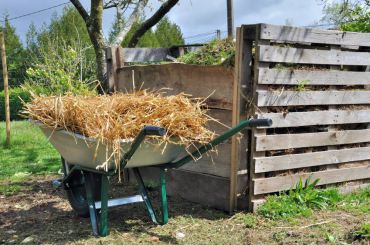 Approximately one-third of food worldwide is thrown away, with the vast majority ending up in the landfill. One way we can fix this issue, beyond only buying what we need, is to start composting food waste and other organic matter.
Approximately one-third of food worldwide is thrown away, with the vast majority ending up in the landfill. One way we can fix this issue, beyond only buying what we need, is to start composting food waste and other organic matter.
While many think compost is simply a soil add-in used to create bountiful gardens, it’s much more than that — it’s the key to protecting our planet. Composting reduces the production of greenhouse gases, can help reduce water usage and contributes to a circular economy. If you aren’t sure how composting achieves these benefits or are wondering how to compost with ease, read on to find out.
Why Is Composting Important?
1. Encourages a Circular Economy
The world primarily functions on a linear model — extraction, production, consumerism, waste — which has led to unsustainable resource extraction and an overwhelming amount of landfill waste. However, composting is part of a more sustainable approach called the circular economy, which not only provides the foundation for zero waste living, but it’s also the answer to slowing down the alarming rate we are consuming natural resources.
In a circular economy, products have no end of life, so nothing ends up in the landfill as resources are continuously recycled and reused. Here is where composting comes into play: By composting, you are creating a nutrient-rich fertilizer that new vegetation can use to thrive. If all food waste got composted, this cycle could continue indefinitely — no food would end up in the landfill and instead, it would consistently provide nutrients to crops and create new food.
2. Doesn’t Produce Greenhouse Gas
When food and organics break down anaerobically (without air), such as in a landfill, they produce the greenhouse gas methane — a gas that heavily contributes to global warming and is more potent than CO2. In contrast, composting allows these items to break down with air circulation, so little-to-no emissions get produced.
3. Can Help Combat Pollutants
Compost is full of microbes and some help break down pollutants. In fact, compost is a cost-effective solution that has been used to rehabilitate soil contaminated by hazardous waste. A 19-year study by the University of California has also shown that composting is key to carbon sequestration in soil — removing and storing CO2. Carbon sequestering is vital since it can help mitigate and maybe even reverse climate change.
4. Saves Water
When compost gets added to soil, it allows it to retain water for a longer period. This means that if you add compost to your garden, you will need to water it less frequently and use less water overall. Access to compost also allows farmers to save water on a larger scale.
5. Reduces the Need for Fertilizer and Pesticide
Using compost in farming or even your garden infuses soil with key nutrients and attracts worms, both of which help yield bountiful crops. Plus, it allows you to skip the fertilizers that come in wasteful packaging and have ingredients that can pollute the environment or harden soil over time — ironically, making it less fertile. Additionally, since healthier plants are better at fending off pests, compost indirectly reduces the need for pesticides. And even when pesticides are needed, the presence of fertilizer helps prevent it from leaching into groundwater.
Tips for Successful Composting
If you are itching to start composting after hearing about how impactful this practice is, here are a few tips that will make composting a breeze.
Make it convenient: It’s inconvenient to trek outside every time you have something for the compost bin or pile. So instead, use a small kitchen bin to collect scraps and empty it in the outside receptacle after a couple of days or once full.
Use your freezer: If your indoor compost bin smells, consider placing your compost in the freezer until it’s ready to be brought outside. This is especially helpful if you live in an apartment and have to bring your compost to a composting center. Alternatively, you can also opt for a bin with a carbon filter to keep odors at bay.
Place a bin in the bathroom: There are lots of items in the bathroom that can get composted — hair, nail clipping, tissues, etc. — but they often end up in the garbage because it’s more convenient. To fix this issue, place a small compost bin in the bathroom.
Run it through the dishwasher: Every once in a while, give your indoor compost bins a good scrub with hot water and soap. If they fit in the dishwasher, this is also an option. The same goes for reusable compost bin liners.
Know your greens and browns: If you have a backyard compost pile or receptacle, knowing how to balance green and brown items ensures speedy composting, keeps your pile at the right temperature and helps avoid strong odors.
Green items are often wet and rich in nitrogen and protein. These include fruit and vegetable scraps, grass clippings and animal manures. Browns are usually dry and rich in carbon and carbohydrates. These include cardboard, hay and sawdust. The ideal ratio is approximately three-part brown and one-part green in a compost pile, but it doesn’t have to be exact.
Reconsider meat and dairy: If you’re opting to use a backyard compost pile, steer clear of meats, fats and dairy as they tend to attract wildlife, don’t breakdown well and can lead to a rancid odor. On the other hand, commercial compost sites often can handle these items since their large piles conduct more heat. However, each jurisdiction has its own composting guidelines, so be sure to check yours to see if meat and dairy products are accepted.
There is no Planet B, so we need to start embracing practices that maximize our natural resources and protect our environment. And composting is a great place to start. By composting, you are lending a hand to combat global warming and contributing to the healthy change that our planet direly needs.




























Comments